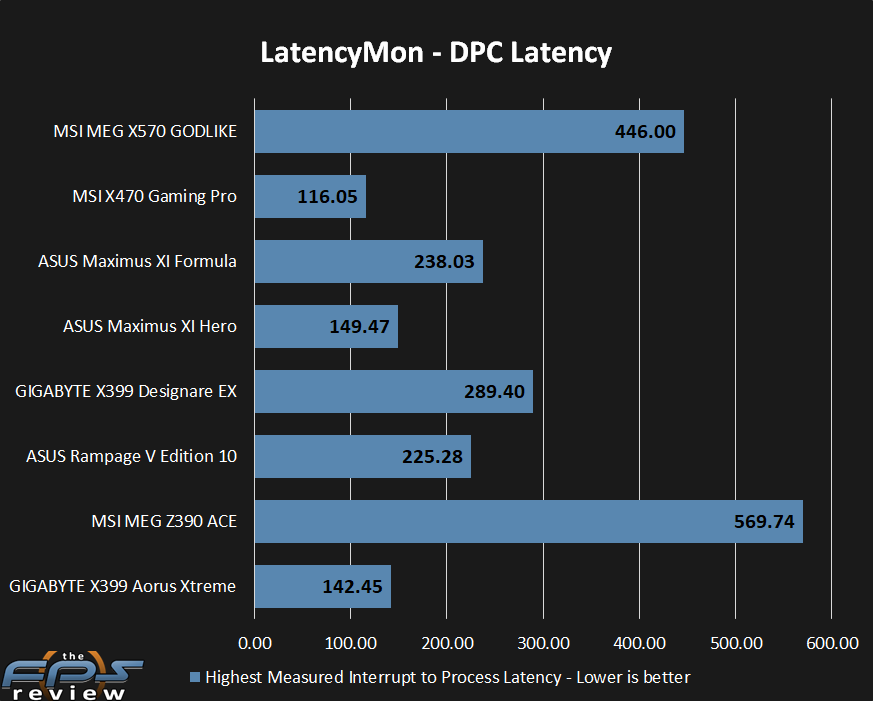Subsystem Testing
NOTE: For all Subsystem Testing, an AMD Ryzen 9 3900X (3.6GHz / 4.6GHz Boost) and 2x 8GB (16GB total) G.SKILL Trident-Z Royal (3600MHz DDR4 16-16-16-36, 1T@1.35v) memory modules running at DDR4 3200MHz speeds were used. For power, I used the Enermax MaxTytan 800watt unit. Our discreet graphics card needs were handled by a GIGABYTE RTX 2080 Ti Aorus Xtreme 11G. The CPU was cooled with a Koolance Exos 2.5 system and an Alphacool Eisblock water block.
Sound Hardware
MSI went with dual Realtec ALC1220 7.1 HD audio CODECs. These are EMI shielded and have dedicate amplifiers that auto-detect the impedance of connected devices. This implementation features an isolated design with audio channels in separate PCB layers. A de-pop circuit is also present to eliminate the annoying pop you hear when plugging or unplugging devices as the name implies. There is also a third CODEC, which is an ESS E9018 CODEC. The ESS CODEC is the one attached to the 6.3mm headphone jack. An adapter is provided so that you can connect this CODEC to a standard mini-stereo jack via the back panel.
The following specifications were taken from the manufacturer’s website:
- 2x Realtek® ALC1220 Codec
- 7.1-Channel High Definition Audio
- Supports Optical S/PDIF output
- ESS® E9018 Codec
- Supports 6.3mm Gold-plated stereo headphone out
As usual, the official specs don’t yield that much information.
Audio – Subjective Listening
For general audio testing, I logged into my Spotify account and played various songs on my playlist. The audio quality excellent, yielding a rich and full sound using both the Realtek and ESS CODECs. The latter was more powerful, providing higher levels as anticipated.
Audio – Microphone Port Testing
The onboard audio MIC-IN port was tested using an old analog Corsair gaming headset. I am unsure of the precise model. Spoken words were recorded from the Windows Sound Recorder found under the Accessories folder in the start menu within Windows. The recording was using the highest quality settings available in the control panel for the audio device being used to record.
During playback of our recording sample, there was no perceptible distortion. Audio levels were relatively high, but with the microphone boost option, they were much lower than with this option checked.
Gaming Audio Quality
In the gaming test, I used Shadow of the Tomb Raider, Destiny 2, The Division 2, and Hitman 2. These were tested briefly while messing around with benchmarking the system. The gaming audio quality was outstanding. Using the Realtek CODEC, I almost couldn’t believe it was the Realtek CODEC. When I connected to the ESS, it was like night and day as it was clearly the better option. Both CODECs did their job well, with the ESS seemingly better suited to higher-powered headphones.
DPC Latency
For those who may not know what DPC is, I’ll explain. Deferred procedure calls are a function within Windows that allows higher priority tasks such as device drivers to defer lower priority tasks for execution at later times. It’s an interrupt and reassignment of sorts performed by the operating system.
DPC latency varies from board model to model and brand to brand. DPC issues show up in the form of audio dropouts and streaming video issues. Naturally, this is something that the enthusiast would want to avoid. I used LatencyMon and let it run for 10 minutes to graph the results. I have compiled a list of several systems I’ve tested over the last year and placed the results in a graph for easy reference. This way we can compare DPC results to other motherboards which should be more meaningful than the old format I used before.

In our DPC latency test, the highest measured interrupt to process latency was 446.00 making it the second-worst in our lineup. That said, newer platforms with early BIOS revisions are often this way. The result was still within an acceptable range, and therefore I’m not concerned about it.
